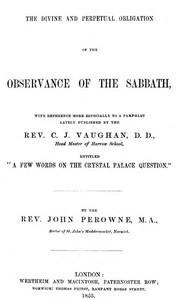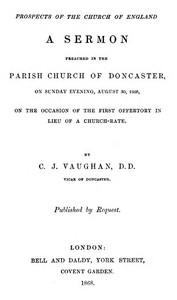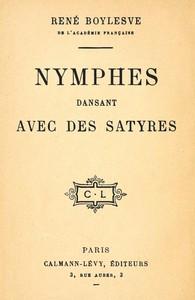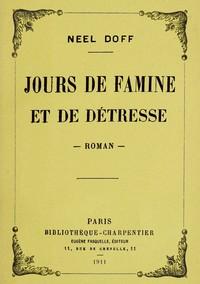Read this ebook for free! No credit card needed, absolutely nothing to pay.
Words: 14263 in 3 pages
This is an ebook sharing website. You can read the uploaded ebooks for free here. No credit cards needed, nothing to pay. If you want to own a digital copy of the ebook, or want to read offline with your favorite ebook-reader, then you can choose to buy and download the ebook.


: Mutiny by Perowne John - Sabbath Biblical teaching; Vaughan C. J. (Charles John) 1816-1897. A few words on the Crystal Palace question
Transcribed from the 1853 Wertheim and Macintosh edition by David Price.
THE DIVINE AND PERPETUAL OBLIGATION OF THE OBSERVANCE OF THE SABBATH,
WITH REFERENCE MORE ESPECIALLY TO A PAMPHLET LATELY PUBLISHED BY THE
ENTITLED "A FEW WORDS ON THE CRYSTAL PALACE QUESTION."
LONDON: WERTHEIM AND MACINTOSH, PATERNOSTER ROW; NORWICH: THOMAS PRIEST, RAMPANT HORSE STREET,
PREFACE
The following pages are published with considerable reluctance. The Author read Dr. Vaughan's pamphlet several weeks since, and was much pained that some of the sentiments contained in it should proceed from such a quarter. He hoped and expected that some one with more leisure than he can command, and more capable of doing justice to the important points under discussion, would undertake to refute what he felt to be the very erroneous notions of the learned Doctor. Since, however, no one else has taken up the subject, he ventures to submit his sentiments to the Christian public. He has no love for polemics, and very unwillingly appears in print; but he has reason to know, that the notions to which he alludes have already, in several instances, encouraged a violation of the Sabbath, and that they are likely to produce more extensive mischief, from the circumstance of no attempt having been made to refute them. To prevent this evil, is one object of the present undertaking. Another is, to counteract the erroneous sentiments of Dr. Vaughan's pamphlet; while the writer's chief aim is, to set forth what he believes to be the will of God on the important subject of the Sabbath. He is convinced that the principles enunciated in the following pages are in conformity with the teaching of the Bible; and being fully assured that obedience to the will of our Heavenly Father, is in all things the only way of peace and safety, he will rejoice if this pamphlet shall become the means of removing error, or of confirming those who already believe that the Sabbath is of divine and perpetual obligation.
THE DIVINE AND PERPETUAL OBLIGATION OF THE SABBATH.
Another thing that we could not help remarking, was the manner in which the authority of the Old Testament is repudiated. "With reference to the observance of the Sabbath, and to every point of moral duty, the appeal now lies primarily to the scriptures of the New Testament, and secondarily to any other records which we may possess of the practice of the apostolical age." How different is the mind of Dr. Vaughan from that of the Apostle Paul on this important point. The Apostle tells us , that all scripture is "profitable for doctrine, for reproof, for correction, for instruction in righteousness, that the man of God may be perfect, thoroughly furnished unto all good works." Dr. Vaughan tells us in effect, that our rule of practice is the New Testament and tradition!
The Rev. Doctor evidently feels some difficulty in reconciling his views with the teaching of the Church of England. For after speaking of the privilege and blessing of Sabbath observance, as if conscious of the dilemma in which his principles placed him, he proceeds to ask, "And shall those who look back through long years upon their frequent failures to improve the blessing, see no reason for the confession which bewails their past neglect of it, and the prayer which asks help to honour it hereafter?" Now we confess that we cannot help feeling, as we think most must feel, that this attempt to escape from the appearance of inconsistency in using the prayer alluded to, is most unsatisfactory. The prayer to which allusion is here made, is offered by the whole congregation immediately on the reading of the fourth commandment by the Minister. Its language is, "Lord have mercy upon us, and incline our hearts to keep this law." And the meaning and intent of the prayer are thus expressed in the rubric at the head of the commandments in the Communion Service: "The Priest shall rehearse the ten commandments; and the people shall, after every commandment, ask God mercy for their transgression thereof for the time past, and grace to keep the same for the time to come." This, then, is the meaning of the prayer; and in this there is necessarily implied a recognition of the moral obligation of the commandment, with regret for its violation, as well as a prayer for pardon, and for help to keep it in future. But is this the meaning which Dr. Vaughan attaches to the language of this prayer? No, with his views, it must be something of this sort: "Have mercy upon us for not improving this blessing in time past, and incline our hearts to honour this blessing in future." Surely if the fourth commandment be no longer in force, to use this prayer is to confess guilt where no law has been transgressed, to ask pardon where no offence has been committed, and to seek aid to amend what is not legally wrong.
Nor is this the only practical difficulty connected with the views in question. We presume it is the duty of the Masters of our public schools, as well as of the Clergy generally, to teach their charge the Church Catechism. But in the Church Catechism are the following questions and answers:--
Here is a plain acknowledgment that the ten commandments are still in force, and that we are bound by our baptismal vows to keep them. Dr. Vaughan affirms that they have "ceased to be our rule of life." How can these conflicting opinions be reconciled? or how can those persons consistently use the formularies of our church, who so directly contradict her teaching?
Free books android app tbrJar TBR JAR Read Free books online gutenberg
More posts by @FreeBooks

: Prospects of the Church of England A sermon preached in the Parish Church of Doncaster on Sunday evening August 30 1868 on the occasion of the first offertory in lieu of a church-rate by Vaughan C J Charles John - Church of England Sermons; Sermons Englis


: Nymphes dansant avec des satyres by Boylesve Ren - Short stories French; French fiction 20th century






